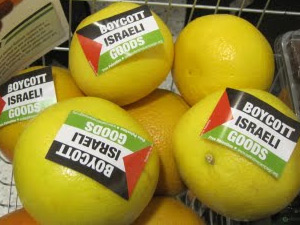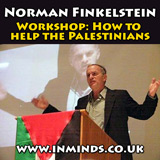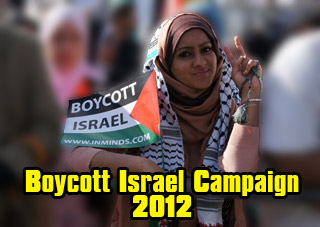
 Innovative Minds © 2014. All Rights Reserved. www.inminds.co.uk | ||||||||||||||
Israeli Arabs ban settlement productsPress TV Israeli Arabs have launched a wide-ranging boycott of Israeli products in a show of protest against Tel Aviv's ongoing expansion of its illegal West Bank settlements.  Palestinian retailers are to put up lists of settlement-made items in their outlets, notifying shoppers which products they should shun. Representatives of community-based organizations and non-governmental organizations (NGOs) are scheduled to attend a conference in Nazareth on Thursday to formally launch the boycott campaign. According to the organizers of the movement, the list of settlement-produced goods includes more than 1,000 items ranging from fruits and vegetables to computers. Among the companies listed to be banned are Ahava Dead Sea health products, Beigel & Beigel pretzels, Super Drink soft drinks and Openheimer chocolates, Ma'an news agency reported. "We are launching a campaign ⦠to show solidarity with the Palestinian people and to wage a battle against the settlements and the occupation," chairman of the Kafr Kana public committee Mansour Dahamshy said. "We need to help the Palestinian economy to sustain itself and not leave it dependent on settler-owned companies⦠As it stands, the settlers take advantage of the Palestinian people." The boycott is backed by the Monitoring Committee of the Israeli Arab Leadership -- an extra-parliamentary umbrella organization made up of local Arab authorities along with prominent Arab organizations and parties. In an interview with The Jerusalem Post, chairman of the committee Muhammad Zidan said the boycott had been part of the commission's agenda since 1998, but was being reinforced more intensively. "The leadership of the Palestinian Authority has called for the boycott, and similar campaigns are gaining traction in Europe. As part of our commitment to a sovereign Palestinian state within the 1967 borders, we choose to help the Palestinian economy by forcing out the settlers and ending the occupation," Zidan said. Meanwhile, Israeli right-wing lawmakers protested the move, saying it was impossible to differentiate between the boycott of goods manufactured in the West Bank and a complete boycott of Israeli goods. Source: http://www.presstv.ir/detail.aspx?id=125624§ionid=351020202 Arab Israelis boycott W. Bank goodsRon Friedman, The Jerusalem Post "We are part of the Palestinian people," Kafr Kana leader says. Arab leaders in Israel are preparing a boycott of settlement-made products, following Palestinian Authority President Mahmoud Abbasâs call for such a ban by West Bank Arabs.
A study conducted by the Amar Society estimated that Israelâs Arab population contributed annually between US$ 104 million - US$ 156 million to the settlement economy.
Starting on Thursday, Israeli-Arab retailers will be urged to place lists of settlement-made items in their establishments, notifying shoppers which products to avoid. Among the 1,000 companies slated to be boycotted are Ahava Dead Sea health products, Beigel & Beigel pretzels, Super Drink soft drinks and Openheimer chocolates. âWe are launching a campaign across the entire Arab sector to boycott all goods manufactured in the West Bank settlements,â said Mansour Dahamshy, chairman of the Kafr Kana public committee. âWe mean to show solidarity with the Palestinian people and wage battle against the settlements and the occupation.â Representatives of dozens of community-based organizations and NGOs are scheduled to attend a conference in Nazareth on Thursday, where the campaign will be formally launched. Dahamshy said the campaign was a grassroots initiative, but that the organizers hope to add politicians and public officials to the effort in the future. âAs part of the Palestinian people, it is our role to assist in the international efforts to boycott settlement-made products. We aim to free the West Bank of settlements, and one way of doing that is by harming their economy,â he said. âAll production in the West Bank should be owned and operated by Palestinians, not Israelis or settlers. We need to help the Palestinian economy to sustain itself and not leave it dependent on settler-owned companies. It is also in Israelâs interest to strengthen the Palestinian people and give them hope for a better future. As it stands, the settlers take advantage of the Palestinian people, whom they hate, and do nothing to improve their condition.â One organization taking part in the campaign is the Monitoring Committee of the Israeli Arab Leadership, an extra-parliamentary umbrella organization made up of Arab heads of local authorities and major Arab organizations and parties. Muhammad Zidan, the committeeâs chairman, told The Jerusalem Post in an interview that the campaign was a forceful reiteration of the committeeâs ideals. âBoycotting settlement products has been part of our agenda since 1998, but today we are acting more intensively. The leadership of the Palestinian Authority has called for the boycott, and similar campaigns are gaining traction in Europe. As part of our commitment to a sovereign Palestinian state within the 1967 borders, we choose to help the Palestinian economy by forcing out the settlers and ending the occupation,â he said. Zidan cited a study conducted by the Amar Society, which estimated that Israelâs Arab population contributed between NIS 400 million and NIS 600m [US$ 104 million - US$ 156 million]. to the settlement economy. âThat is a substantial amount. If all Arabs and others who support our cause will join in the boycott, we can help bring our vision of an independent Palestinian state closer,â he said. According to the campaign organizers, the list of settlement-produced goods includes more than 1,000 items. âThe list includes everything from fruits and vegetables to computers. We will place the list in shops and place stickers requesting that people abstain from purchasing settlement-made goods. Arab shopkeepers will be ashamed to sell the goods anymore after that,â Dahamshy said. Dani Dayan, chairman of the Council of Jewish Communities of Judea, Samaria and the Gaza Strip, declared, âThis is not an autonomous decision by the Israeli Arabs. They are following a decision by [PA Prime Minister] Salam Fayyad, who burned Israeli [settlement] products in [the West Bank village of] Sulfit. What we are seeing here is a complete identification, and not for the first time, by the Arab population of Israel with the Palestinian Authority.â Such boycotts are a violation of the 1994 Paris agreement between Israel and the PLO, said Dayan, calling on the government to take the PAâs âincitementâ and âeconomic warfareâ seriously and to compensate settlers for financial damage that could be caused by such a boycott, using money that Israel transfers to the PA every month. âIsrael has a duty to fight this politically motivated boycott against a sector of its citizenship,â Dayan said. A boycott against the settlements is a boycott against Israel, he asserted. He rejected any attempts to separate the two. âIn Arab eyes, [the existence of] Israel is under debate, so exactly the same logic applies,â Dayan said. Right-wing MKs also said it was impossible to differentiate between the PAâs boycott of goods manufactured in the West Bank and a complete boycott of Israeli goods. The lawmakers reinforced statements that they made during a meeting of the Knessetâs Economic Affairs committee earlier this week. âWe do not differentiate between a boycott of goods from Judea and Samaria and a boycott of any other Israeli goods,â said Deputy Foreign Minister Danny Ayalon (Israel Beiteinu), who participated in Sundayâs committee meeting. âThe boycott is in violation of signed Israel-Palestinian agreements. Not only does the Israeli public feel that the boycott is psychologically the same, it is also operatively a boycott against Israel because it impacts the entire Israeli economy.â MK Uri Ariel (National Union), who pushed for the initial committee hearing on the impact of the boycott, said he, too, did not feel there should be any differentiation between a boycott of West Bank industries and of the Israeli economy as a whole. Arielâs spokesman, Hagi Schori, said Ariel believed the intent was to expand the boycott to all Israeli goods, and emphasized that it was impossible to differentiate between companies that operated in the West Bank but were based within the pre-1967 boundaries, and companies that based their production in the West Bank. Rebecca Anna Stoil contributed to this report.
Analysis: Boycott puts social cohesion at riskRon Friedman, The Jerusalem Post Israeli Arabs are starting to discover leverage. While it is too early to tell if Israelâs Arab population will answer the call to boycott goods made in the settlements, the mere suggestion is enough to anger large portions of Israeli society, which see the Arabs siding with the Palestinians as proof that they cannot be trusted.
Arabs, who make up roughly 20 percent of the countryâs population, may not be represented in the government, but their money is honored everywhere. And while a 15-20% cut in income overnight may not ruin the settlement industries, it will affect their bottom line, especially when combined with the recently announced Palestinian boycott and the ongoing boycott calls in Europe.
Arab-Israeli disapproval of the settlements is not new. Nor is Arab-Israeli identification with the Palestinian people. Many in the Arab population consider the Palestinians their brethren; and even if they donât wish to join them, they do seek to support their quest for national sovereignty. Whatâs novel about the new initiative is that like other social groups in Israel, Israeli Arabs are beginning to discover the leverage that combined purchasing power can wield in a capitalist society. These Arabs, who make up roughly 20 percent of the countryâs population, may not be represented in the government, but their money is honored everywhere. And while a 15-20% cut in income overnight may not ruin the settlement industries, it will affect their bottom line, especially when combined with the recently announced Palestinian boycott and the ongoing boycott calls in Europe. The government is aware of the financial power Arab Israelis wield and has, in the past, channeled it in constructive ways. For example, Israel acknowledges that by allowing Arab Israelis into the West Bank territories, it can help boost the Palestinian economy. It recently did so, in fact, by opening the Jalameh crossing, near Jenin, to Arab Israeli citizens in the hope that they would spend their money in the Palestinian Authority and help raise employment levels and living conditions there. What may bother many Israelis, especially those on the Right, is the proximity of the Arab-Israeli boycott to President Mahmoud Abbasâs call for a Palestinian boycott. Some see the reinvigorated boycott movement, which has been in existence â but largely silent â for the past decade, as a provocation aimed at inflaming an already tense situation. The timing of the boycott calls, on the eve of proximity talks, lends some credence to this. The Arab-Israeli boycott initiative highlights the extremely divergent positions that exist in Israeli society regarding the settlements. On the one hand you have the settlers and their supporters, who see the Jewish presence in the West Bank as an ideological, some might even say religious, imperative. On the other hand are the Arab Israelis and those on the Left, who see the settlements as an ongoing crime and a continuation of 19th-century colonialism, worthy of opposition by any means. In the past, the means the Arabs adopted to express their solidarity was violent confrontation. The memory of the Arab-Israeli uprising in October 2000, which saw 12 Arab Israelis and a Palestinian from the Gaza strip killed in confrontations with police in the Galilee and a Jew killed by Arab youth while driving on the Haifa-Tel Aviv freeway, left a deep scar on the Israeli psyche and sowed seeds of doubt about the Arabsâ loyalty to the state. Since then, there have been no casualties of organized violence by Israeli Arabs, despite ongoing tension between the state and the PA. While there have been protests, they have tended to be nonviolent and even less forceful than organized demonstrations by other groups â for example, the recent haredi protests over the opening of a Jerusalem parking lot on Shabbat, or the weekly demonstrations by left-wing activist in Bilâin. Placing lists of settler-made products in stores to alert shoppers to what not to buy may not be a popular move, but few would argue the point that it is preferable to other forms of political protest. Assuming that many will not heed the call and will continue to buy settlement-made products â whether out of habit or ignorance or apathy â the financial harm to the settlers will be minor. What may cause more significant harm is if the Arab boycott becomes a wedge issue, further damaging the cohesion of Israeli society. Source: http://www.jpost.com/Israel/Article.aspx?id=174823 Islamic Movement: Boycott settler goodsSharon Roffe-Ofir, Yedioth (Ynetnews) The northern branch of the Islamic Movement on Wednesday joined Arab states and the Palestinian Authority and called for a boycott of settlement goods. The call was directed at both Jewish and Arab citizens of Israel, and the main justification was that the settlements undermine the peace process. The Movement's leaders in the north have launched a campaign in both Hebrew and Arabic which reveals the names of hundreds of enterprises located in the settlements, including those in the Barkan, Atarot and Maaleh Adumim industrial zones. "We want Jews and Arabs to take a step together to promote peace," the Movement said. In recent weeks, the Amar society, which operates for the Islamic Movement in the north, has been working on the campaign. "We have nothing personal against those enterprises or their owners," said Attorney Omar Hamaisi, one of the program's initiators. "They can move to Haifa or any other place â we've got no problem with that. As long as they operate in the settlements, according to the ruling of the International Court in the Hague â this is a grave violation, and they are thus law-breakers." The Arabic version will begin Wednesday, and the Hebrew will follow within a few days. "We want to take a step together, and we think that Jews and Arabs should support this," Hamaisi added. "The settlements are stalling the peace process, and boycotting them is for the good of everyone." Ittijah, the Union of Arab Community-Based Organizations in Israel also answered the call. "We call for a boycott and sanctions against Israel," said the organization's director Ameer Makhoul. "This is the only way that we can put pressure on Israel and its policies." Will wholesalers and retailers in the Arab sector answer the call and avoid placing settler goods on their shelves? "I am sure that numerous such products will be found, so our call is mainly to the outside world," Makhoul explained. "It's true that it should also happen here, but it is impossible to ask everyone to check where every product comes from. Outside Israel it's clearer, and that's why we choose to apply the pressure in that direction." Source: http://www.ynetnews.com/articles/0,7340,L-3885314,00.html Related ArticlesAlso Of InterestPage URL: http://www.inminds.co.uk/article.php?id=10376
|
|
Support Us
If you agree with our work then please support us.Campaigns INMINDS Facebook Live Feed Latest Video's
INMINDS Twitter Feed Tweets by @InmindsComFeatured Video's
You need Flash player 8+ and JavaScript enabled to view this video.
[all videos (over 200)..] Featured MP3 Podcast  "What they did last night was more important than 10,000 peace conferences - they just blew up the wall!" Author of 'The Holocaust Industry' speaking of the smashing of the wall between Gaza and Egypt by Hamas How to help the Palestinians workshop, FOSIS Jan 2008 [63min / 26Mb] [all podcasts..] Newsletter Feedback |
 |
 |






















































